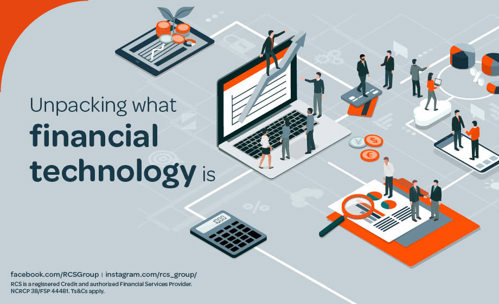Financial Technology
15 AUGUST 2023
Fear it, love it or hate it, at some point we’ve used it or encountered it. This blog unpacks what financial technology, AKA FinTech is, and how it affects our everyday life and financial well-being.
So what is FinTech?
"FinTech" is a combination of the words, "finance" and "technology," and it refers to any business that employs technology to improve or automate financial services and operations. This is a fast growing industry, which benefits consumers as well as businesses in various ways. Cellphone banking, insurance, cryptocurrencies, and investment apps are just a few of the many FinTech out there.
FinTech isn't particularly new, it's just an industry that has developed pretty fast in recent years. The introduction of credit cards dates back to the 1950s, as well as ATMs, electronic trading, personal finance applications, and high-frequency trading in the decades that followed. All these progressive functions have contributed to the evolution of financial technology.
The popularity of cellphone banking is directly related to the popularity of smartphones - obviously. As such, it’s a significant part of the financial technology sector. Bank users, particularly those with smartphones and tablets, have come to expect easy online access to their bank accounts.
With the rise of "Neobanks," or digital-first banks, most major financial institutions now provide some form of cellphone banking service. Neobanks are decentralized financial institutions that operate entirely online and via mobile devices, offering a full range of banking services to their consumers without any physical branches. Examples of these are TymeBank and Discovery Bank.
Huge pluses for the consumer.
Investments and Savings
In recent years, there has been a massive increase in the number of investment and savings apps. Breaking down obstacles to investing has become easier thanks to companies like Easy Equities and Stash. These apps are all different, but what they all have in common is accessibility to the common man. They do a fantastic job at introducing the consumer to markets and simple ways to start saving.
Trading
A lot of us are triggered by the term “trading” because we’ve all experienced that scam looking inbox on social media from a guy claiming to change your life with trading. Chance takers aside, being able to predict where the market is going is the superpower of finance. FinTech enables huge amounts of data to be run through algorithms designed to monitor trends and risks. This allows investors and buyers to make better decisions earlier on in the process.
Paying and Lending
Fintech is reshaping the credit industry by simplifying risk assessment and speeding up the approval process. Existing data points and risk modeling skills are making it easier than ever before for billions of people all over the world to apply for a loan via their cell phones. In addition, people can get free credit reports as many times as they like each year without having their score affected, making the financing process more open to the public.
Why should you care?
At the end of the day FinTech has allowed people greater control over their financial life than ever before. Modern technology is being used to break down old barriers and improve the financial well-being of customers.
Phrases like “I’ll e-wallet you”, or “I’ll just snapscan” are a part of normal language now, and quite frankly, you do yourself a disservice if you aren’t acquainted with these ways of transacting.
Because of FinTech, it's no longer a race to be the biggest, but rather one to be the fastest and most responsive to the ever shifting needs of customers. Furthermore, FinTech organisations' solutions are no longer "one-size-fits-all." Instead, they provide specialised – and often niche – financial services to meet a specific demand, generally at lower rates than traditional financial institutions.
The FinTech businesses that flourish will be those who continue to innovate in delivering new answers to old issues as customers grow more savvy and connected.
MORE ARTICLES ABOUT
RELATED ARTICLES

Education
12 JUNE 2025
Cultivating Tomorrow's Leaders: Equipping Young South Africans for Life’s Challenges

Education
28 MARCH 2025
Cyber savvy kids: How your children can safeguard themselves against online scammers

Education
17 FEBRUARY 2025
